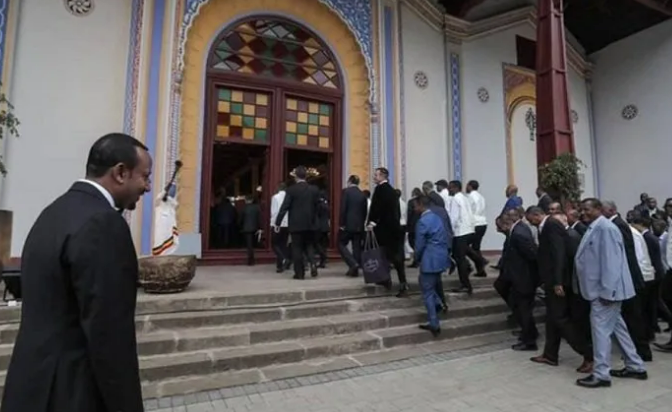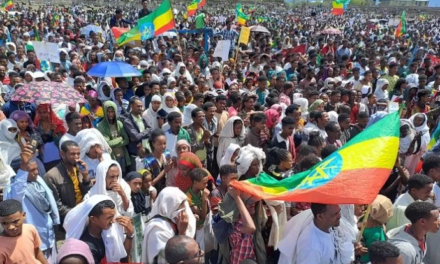by Abebe Gellaw
The reckless politics of destruction, helmed by Abiy Ahmed and Shimelis Abdisa, have been characterized by hasty and arbitrary decisions. This includes the unsettling directive to demolish existing structures and homes without due process, and carving out space for lavish projects like gran palaces and the proposed satellite cities. It’s disconcerting to observe these ruthless policies leaving tens of thousands of citizens homeless.
The current regime has displayed a cruel inclination towards the creation of fancy projects such as palaces and a new city, Sheger. This ambitious endeavor, expected to drain vast resources, may ironically lead to the neglect of the capital. Such a short-sighted, incongruous decision seems at odds with the immediate necessities of a nation grappling with multifaceted challenges including the impacts of the devastating war in Northern Ethiopia.
Amidst the tumult, Ethiopia has been fighting to recover from a debilitating war that wreaked havoc, death, and destruction of biblical proportions. The scale of the destruction is staggering, with substantial chunks of the country left in ruins. The war’s aftermath has crippled socio-economic structures and dramatically impacted countless lives. The real victims of this catastrophe are the millions of Ethiopians left grappling with displacement, food scarcity, and rampant economic instability. These pressing issues require swift and decisive action.
The proposition to funnel scarce resources into the construction of Sheger, while the nation yearns for recovery and restoration, is perplexing. Such a colossal project raises valid concerns about the regime’s strategic foresight and fiscal wisdom. Abiy Ahmed’s myopic endeavors could potentially stunt Ethiopia’s development, leading to prolonged stagnation or, worse, regression. The resource diversion could lead to the gross neglect of existing urban centers, thereby deepening the socio-economic divide between the privileged and the impoverished.
Rather than focusing on grandiose, resource-draining projects, the government should redirect its efforts toward rehabilitating war-torn regions. Such an approach would not only facilitate healing but also instill faith in the government, fostering national unity and solidarity. It’s critical for the regime to revisit its priorities, ensuring alignment with the genuine needs of its citizens during these trying times.
In a country like Ethiopia, where poverty is pervasive and many live in informal settlements, the abrupt demolition of homes illegally without due process can trigger severe societal implications. The alarming measures undertaken by Abiy Ahmed and Shimelis Abdisa, often perceived as politically-motivated and prejudiced actions against the underprivileged, will have significant repercussions.
Immediate displacement and a surge in homelessness are among the primary outcomes of these actions. They can lead to a drastic increase in dangerous living conditions, with vulnerable groups such as children, women, the elderly, and the infirm exposed to life-altering risks. This situation can escalate into a public health crisis, causing widespread suffering and potential fatalities.
The unlawful demolition of houses often entails grave human rights violations, including the infringement of the right to adequate housing, personal and property security, life, due process, and fair compensation for property loss. Furthermore, this can disrupt livelihoods, especially for those who operate informal businesses from their homes or depend on their location for sustenance, amplifying poverty levels and economic distress.
Mass demolition can also fracture social structures, increasing vulnerability to exploitation and abuse, particularly for women, children, and other high-risk groups. Displacement can lead to an uptick in health issues, particularly due to the absence of clean water, sanitation, and healthcare facilities. Moreover, it can disrupt the education of displaced children, putting their futures at stake.
Heightened vulnerability to crime is another by-product of displacement, with individuals potentially becoming both victims and perpetrators. This can be attributed to the desperation and instability brought on by their circumstances. Additionally, large-scale, forced evictions often breed long-term political unrest and instability, eroding trust in the government and escalating societal tensions.
It is imperative for the regime to reevaluate its strategy in light of the societal and economic repercussions that stem from its actions. Rather than investing billions into grand palaces and building a city on top of an existing one, the government should focus its resources on rebuilding areas ravaged by conflict and supporting the country’s economic recovery. This strategic shift in priorities would better align with the needs of the Ethiopian people, who are presently dealing with the aftershocks of war and the harsh realities of rampant inflation.
Historically, Ethiopia has been significantly dependent on foreign aid, and as such, must judiciously utilize its limited resources. Lavish spending on palace constructions appears to be a myopic gross misalignment of priorities in a nation currently grappling with economic hardship and urgent humanitarian needs.
The fancy palaces, far removed from the lives of everyday Ethiopians, stand as stark symbols of inequality in a country still dealing with widespread poverty. Such disparity not only raises ethical questions but also risks inciting resentment and social unrest among the population.
The government’s initiative to build a new city on top of an existing one also raises further doubts about its strategic planning and financial acumen. This grand scheme, anticipated to come at a huge cost, seems detached from the pressing needs of a nation recovering from conflict and economic turmoil. Such out-of-touch projects could deepen socio-economic disparities by diverting resources from critical services that will starve much-needed recovery projects.
It’s time for the government to step back and reassess these extravagant projects in light of the broader socio-economic contexts. Instead of committing to building grand palaces and a whole new city, it should concentrate on restoring conflict-torn regions, stabilizing the economy, and investing in essential social infrastructure like healthcare, education, and affordable housing. These meaningful actions would foster sustainable development and improve the lives of the Ethiopian people in these challenging times.
Abiy Ahmed needs to empathetic leadership, rather than repeating the blunders of the past, by prioritizing the well-being of citizens and their needs over kleptocratic displays of wealth and power. Abandoning these extravagant projects would not only allocate resources more effectively but also send a clear message to Ethiopians and the international community that the government is committed to responsible governance and social justice.
—
The foregoing article was republished from borkena.com








